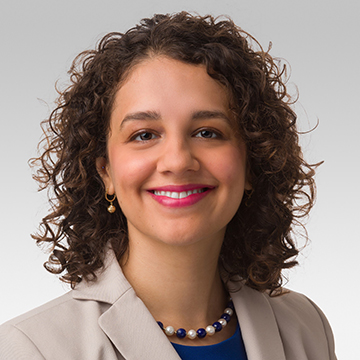CTIA Pilot Grant Leads to Five Years of Research Support
In the next 12 months, an estimated one in two Americans will experience financial toxicity.
While you may not be familiar with the term, you’re likely aware of the negative impact that medical care costs can have on a person’s financial well-being and/or quality of life. This particularly impacts patients with cancer.
“It’s important to give patients with cancer, tools to directly decrease their risk of experiencing the devastating emotional toll of financial toxicity and to allow patients to better prepare for financial impacts of treatment choices,” says Laila Gharzai, MD, assistant professor of Radiation Oncology and Medical Social Sciences in the Division of Outcome and Measurement Science.
Gharzai was recently awarded an ASTRO-ACS Clinician Scientist Development Grant (CSDG) from the American Cancer Society and American Society for Radiation Oncology. The grant provides Gharzai with protected research time (50 percent) over the next five years.
“This is incredibly important for my career as it gives me the time and space to build on my current research skills and grow into an independent investigator,” she says. “These first few years out of training are critical both for solidifying myself as a researcher in terms of my skills and for building a foundation in the areas of research I’m most interested in.”

One of the most important parts of the CTIA program is how it helps junior faculty understand the research infrastructure here at Northwestern, and connects us with amazing mentors like Jyoti Patel, MD, and Ravi Kalhan, MD, MSCI.”
Gharzai is a radiation oncologist and investigator whose academic goal is to advance cancer care while minimizing both short- and long-term side effects from treatment, spanning from physical effects to socioeconomic impacts including financial toxicity. Her scholarly work has included quantifying toxicities after treatment, such as difficulty swallowing after head and neck cancer treatment and incorporating imaging to predict for risk of toxicity.
Her CSDG project builds on Gharzai’s prior work developing a preliminary widely scalable patient-facing educational tool seeking to mitigate financial toxicity. She will use insights from implementation science to ensure that what is developed reaches patients in need and can be sustained through time.
Other ongoing CSDG grants at Northwestern have been awarded to Kelly Bachta, MD, PhD, assistant professor of Medicine in the Divisions of Infectious Diseases, and Irum Khan, MD, associate professor of Medicine in the Division of Hematology and Oncology.
Gharzai credits the NUCATS-supported Clinical and Translational Investigation Accelerator (CTIA) with putting her in a position to apply for the CSDG award.
“One of the most important parts of the CTIA program is how it helps junior faculty understand the research infrastructure here at Northwestern, and connects us with amazing mentors like Jyoti Patel, MD, and Ravi Kalhan, MD, MSCI,” says Gharzai. “It’s wonderful to have the opportunity to learn from incredibly successful researchers, both to broadly understand how to be a successful researcher and more granularly to understand how to do so here at Northwestern. The opportunity to meet with these mentors regularly, for connection and support, cannot be overstated.”
Gharzai also acknowledges the role of David Cella, PhD, and Mohamed Abazeed, MD, PhD, with supporting her early academic research career at Northwestern and supporting her successful CSDG application. Gharzai will undergo additional training in implementation science as part of her CSDG under the mentorship of Sara Becker, PhD, director of the Center for Dissemination and Implementation Science.
“Dr. Becker is my secondary mentor on this CSDG grant and is absolutely a big reason that this got funded — she has such a strong research background and track record of mentorship, as evidenced by the number of people that she’s recruited to join CDIS in the short time that the center has been open,” says Gharzai. “I’m looking forward to learning from her over the next five years.
“Implementation science is so important because we spend so much time and effort working on improving cancer care, but there’s a huge gap of what we know we should do and what actually happens in the community and on our front lines. For example, we know so much about lung cancer screening in terms of who should be getting it, what the benefit is, but our rate of actually completing lung cancer screening is less than 20 percent and is worse in certain racial/ethnic groups. We can use insights from implementation science to help us bridge this gap.”
The CTIA program is supported in part by the National Institutes of Health's National Center for Advancing Translational Sciences, Grant Number UL1TR001422. The content is solely the responsibility of the authors and does not necessarily represent the official views of the National Institutes of Health.
Written by Roger Anderson




